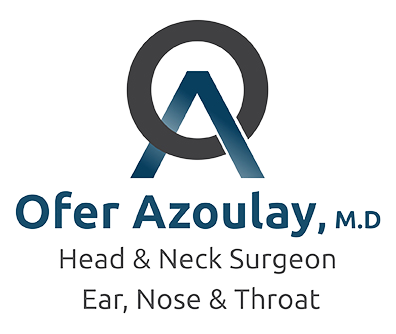Thyroid Nodule and Thyroid cancer
What is the thyroid gland?
The thyroid is a small, butterfly-shaped gland located in the central neck, laying bellow the thyroid cartilage (Adam’s apple). The thyroid consists of two lobes connected by a thin tissue called the isthmus. The gland produces the thyroid hormones, which regulate metabolism.
What are thyroid nodules?
Lumps or bumps in the thyroid gland are called thyroid nodules. Most nodules are cysts filled with fluid or with a stored form of thyroid hormone called colloid. About 95% of the thyroid nodules are benign. Thyroid nodules are common affecting up to 50% of the population above the age of 60. Most thyroid nodules do not cause any symptoms and can be watched without treatment. Some thyroid nodules show up as a painless lump in the neck that you can feel or see. When thyroid nodules become large, they may cause symptoms by pressing on the airway or esophagus.
What is thyroid cancer?
About 5 % of the thyroid nodules can be diagnosed as cancer. Thyroid cancer is a type of cancer that initiate in the thyroid gland cells. Cancer starts when cells undergo genetic changes and begin to grow out of control.
There are multiple types of thyroid cancer:
- papillary thyroid cancer
- follicular thyroid cancer
- medullary thyroid cancer
- poorly differentiated thyroid cancer
- anaplastic thyroid cancer
Papillary and follicular thyroid cancer are the most common thyroid cancer (Over 90%) and are usually highly treatable with surgery and less common with radioactive iodine. With the right treatment the overall prognosis (outcome) of patient with thyroid cancer is excellent with over 95% chances of cure.
What should you expect in your office visit with Dr. Azoulay?
Dr. Azoulay will review your history and will carefully examine your neck and throat.
If indicated, you might be referred for imaging of then neck (usually Ultrasound). Patients with indication for biopsy of the thyroid will be scheduled to complete fine needle biopsy of the thyroid to establish the diagnosis. Molecular and advance genetic analysis can be offered for selected patients to better define the nodules and to prevent unnecessary surgeries. All treatment options, including surgery will be discussed in depth. A multidisciplinary team approach that may include endocrinologist will advise you on all the risks, benefits, and alternative treatments to establish the right treatment plan for you.
Proceadures
Contact Us
- 185 Montague St 5th FL , Brooklyn, NY 11201
- 376 6th Avenue , Brooklyn , NY , 11215
- 718-780-1498
More about Dr Azoulay procedures
Dr. Azoulay offers a personal and holistic care for his patients that is characterized by service, quality and safety

Frequently Asked Questions
Different types of head and neck cancers include:
- Oral cavity: mouth, tongue
- Oropharyngeal: throat, back of the mouth
- Nasal Cavity: nose
- Paranasal sinus: sinuses, openings near the nose
- Nasopharyngeal: behind the nose, upper throat area
- Laryngeal: voice box
- Hypopharyngeal: voice box, lower part of the throat
- Salivary glands (Parotid, submandibular, minor salivary glands)
- Thyroid
- Skin cancer
- Lymphoma
There’s no such thing as a “standard” set of symptoms. Depending on the location and type of cancer some people experience very few warning signs until their cancer has started to spread, while others notice something out of the ordinary right away.
Many symptoms of head and neck cancer can also be caused by other, less serious conditions, such as sinus or throat infections. Even though there’s a good chance that something other than cancer is causing your symptoms, you should still bring them to the attention of a medical professional and discuss the next steps.
Symptoms of laryngeal and hypopharyngeal cancer
Laryngeal cancer develops in the voice box, while hypopharyngeal cancer develops in the lower part of the throat. The most common symptoms of both cancers include hoarseness, constant coughing, difficulty swallowing and a sore throat that does not go away.
Symptoms of oral cancer
Oral cancer can develop anywhere in the mouth, including the lips, cheeks, gums, tongue and palate (roof). The most common symptoms are sores and swollen spots inside the mouth, red or white patches on the lips, difficulty moving the jaw or tongue, loss of otherwise healthy teeth and a feeling that something is stuck in the throat.
Symptoms of nasal cavity and paranasal sinus cancer
Nasal cavity cancer develops in the small passageway just behind the nose. Paranasal sinus cancer develops in the small, air-filled bubbles around the nasal cavity. These cancers typically cause facial pain, nosebleeds, post-nasal drip, watery eyes, changes in vision and nasal congestion that doesn’t go away.
Neck Lump
Neck lump could be simple, swollen, and reactive lymph node. However, a persistent neck mass, that does not disappear within few weeks, even without symptoms, should be evaluated to rule out cancer.
They are as varied as the cancers themselves. Much depends on location, overall health, and cancer staging, or how developed the lesion is and if it’s spread to other areas of the body. Surgical excision is a common treatment as is laser therapy, radiation, chemotherapy, and targeted therapy. Dr. Azoulay fully coordinates care plans from initial diagnosis to treatment to follow-up care.
To schedule an appointment, please call the office at (718) 270 1498.
We participate with most health insurance plans. Please call our office staff at (718) 270 14978 for specific questions.
If your insurance plan requires you to obtain a referral prior to a specialty visit, then contact your primary care doctor first. If your plan allows a specialty visit without a referral, then please call us at (718)270 1498 to arrange your visit.
When you schedule your appointment, the staff will ask you to have your records faxed to our office as soon as possible. This is requested so that we can accordingly schedule those patients in need of an urgent visit. On the day of your visit, you may need to bring original or copies of your radiology studies – for example, CAT scans, MRI, sonograms, or PET scans.
To obtain your written reports and records, you (as the patient) must request that they be sent to our office directly. For originals or copies of radiology films, you’ll need to request them from the radiology office that performed the study(s). There may be a fee associated with this, depending on the radiologist’s policies. If you have had your studies arranged by our office, you do not need to get your films, since we can access them.
Dr. Azoulay operates at New York Presbyterian Methodist Hospital, Maimonides Medical Center, and SUNY Downstate Medical Center. Depending on your condition and preference a surgery will be scheduled to one of the hospitals located in Brooklyn.
CONTACT
1) 185 Montague St 5th FL , Brooklyn, NY 11201
2) 376 6th Avenue , Brooklyn , NY , 11215
718-780-1498
